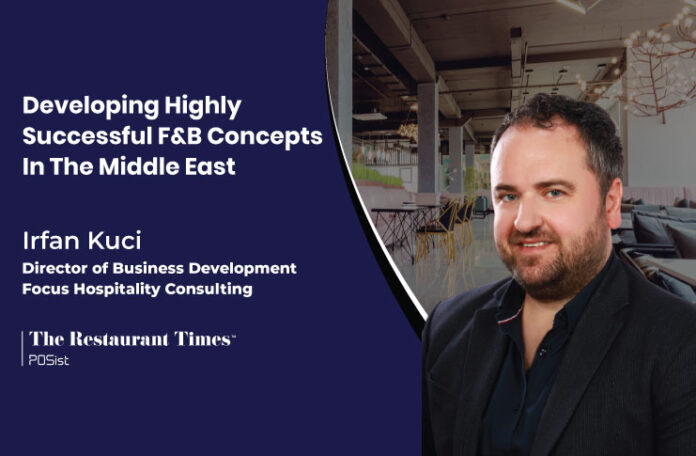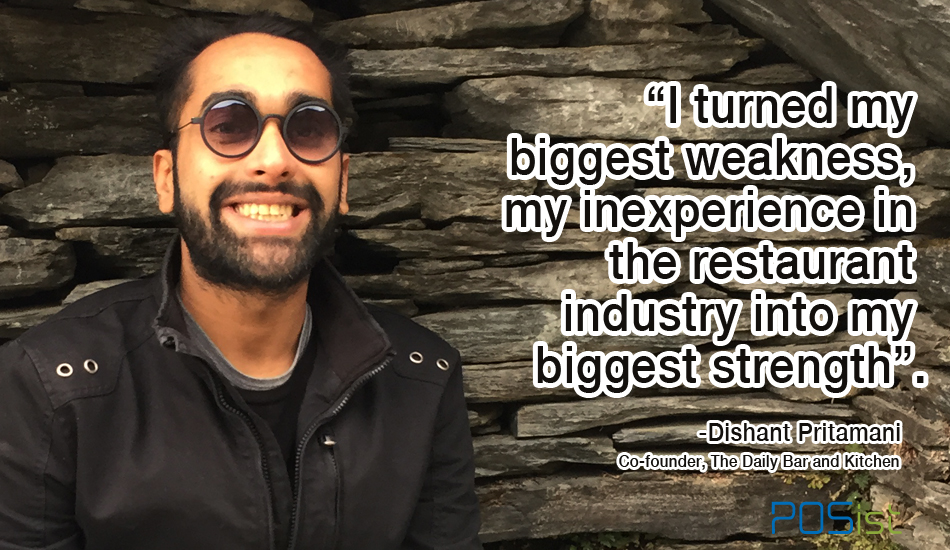Irfan Kuci is the Director of Business Development at Focus Hospitality Consulting (FHC), a growing consulting firm based in Dubai with expertise in Back of House (BOH) design, MEP design, interior design, F&B concept creation, project management, franchising as well as hotel/restaurant operational assessments.
Focus Hospitality has successfully executed hundreds of projects in the UAE, Saudi Arabia, Spain, Tanzania, Kuwait, Bahrain, Oman, and Lebanon. Irfan comes with over 15 years of experience in Sales Strategy at multinational companies. He has spent most of his time in the Middle East but has also extensively worked in the European market. He has deep expertise in market survey and strategy building.
In Conversation With Irfan Kuci, Director of Business Development, Focus Hospitality Consulting
In an exclusive conversation with The Restaurant Times, Irfan Kuci, Director of Business Development, Focus Hospitality Consulting discusses how restaurants can maximize their front and back-of-house restaurant operations.
TRT: Tell us a little about yourself, your consulting experience in the restaurant industry, and your current role at Focus hospitality.
Irfan: After spending over 15 years in Sales Strategy positions at multinational companies, I joined Focus Hospitality early in 2021. We do not necessarily focus only on restaurants but also on multiple hospitality sectors, ranging from resorts, hotels, cloud kitchens, bars, and more. Being part of the Focus team really gives a good insight into the hospitality market in the UAE and GCC. We have also been focusing on other markets in Europe and Asia.
TRT: What is the world view of restaurants you envision from your experience of growing restaurants in the Middle East?
Irfan: The pandemic did change the hospitality industry, challenging people to go beyond the ordinary. With the lockdown, the burden on hospitality and on owners increased and we saw a trend of owners downsizing, some of the businesses were shut down while others applied for government help or took on loans to keep their businesses running.
With the limitations and strict restrictions currently in place, the future of the restaurant industry will look different from what we had seen. In the new normal, restaurant owners are reinventing their businesses by incorporating better delivery services and remodeling their menus. The current times demand innovative ideas and research into how to handle emerging risks and opportunities. Experience plays a huge role and I strongly believe that restaurants will, of course, survive and go through these challenging times.
TRT: As the focus shifts from fine-dining to casual, and now to more ‘pop-up’ and ‘cloud kitchen concepts’, how do you think the restaurant industry is evolving?
Irfan: Restaurants are evolving in a sense of adjusting to the current situation and future predictions. In the UAE, restaurants are operating almost to the level of pre-pandemic times because of the government’s strict rules to combat COVID. A move towards adopting the cloud kitchen model is already on the cards and at the start of the pandemic, there was a huge dependency on them. However, we have to acknowledge that after the initial shift, people are getting back to dine in restaurants more and more.
Although cloud kitchens are capturing a large portion of the market, they also allow restaurants to tap demand in areas they would never have been able to reach otherwise. It further opens a platform for new entrepreneurs to enter the F&B business without investing millions upfront.
TRT: What do you think are the main reasons why restaurant kitchens have not been modernized as fast as we thought through the adoption of digital technology? How do you think software and digital technology help the operations of a restaurant kitchen?
Irfan: I think digital technology is being implemented in restaurants more than ever before. Ordering via a tablet that uses POS software and that order going straight to the kitchen is a vivid example of technology adoption, especially in the UAE market. With technology, people’s lives have become easier and more convenient. I believe that the potential exists for Dubai to be a pioneer in some of these aspects. Overall, restaurants the world over will be more and more digitized and will make restaurant kitchens efficient as well as employees’ lives much easier.
Various benefits, such as optimizing sourcing schedules for ingredients (like expiry dates), digital inventory tracking, tablet ordering, and tracking employee shift adherence, are a few examples of what technology can do inside a kitchen and a restaurant. Having everything digitized has made everyone’s job easier and they can fully focus on Customer Experience.
TRT: How can restaurants improvise their back-of-the-house operations?
Irfan: Having a smart kitchen is a big stress reliever. Through some of the discussions I have had and some of the demonstrations I have attended, an automated process makes kitchen operations easy, efficient, and cost-effective. Having a software system in place which makes a meal with only “one press of the button” seems attractive and makes the life of people working in the kitchen easier. Some of the tech systems available in the back of the house can help chefs view orders on interactive kitchen touch screens and determine which food items to focus on considering the preparation times of each so all items are prepared at the same time which I would say is a perfect meal.
TRT: What are the trends you predict in the F&B business in the coming years?
Irfan: I see a trend leaning towards plant-based foods, street food which have exotic ethnic flavors, a rise of cloud kitchens, food brands getting more active than ever. Going cashless, one-touch payments, and one-touch tips are also on the rise. The popularity of single-dish restaurants like shawarma spots, burger spots, etc is also growing. Since the pandemic, people have preferred more food trucks as they make for good food and safety at the same time. I also think that the focus on customer experience is more than ever.
Whatever we do in F&B, in my opinion, customer experience is one of the two pillars of all successful F&B businesses, food quality being the first one.
TRT: How do you see the growth coming from the Middle East market in 2021- 2022?
Irfan: The Middle East is a vibrant area, filled with people who enjoy going out for occasions and celebrating life. In my opinion, there is growth in all segments of the F&B industry. For example, the IT industry in the UAE is becoming a haven for IT specialists around the globe. On the other hand, tourism is also doing well as tourists are traveling and coming back, which means an increase in repeat customers, driving loyalty and growth for restaurant businesses.
We, in the F&B industry, should be happy we are here, as we get to serve new people every day and make them feel special and a part of the community. The industry is not only about food and business but about customer experience as they are the topmost priority. After the pandemic, we see people doing so-called “revenge spending” and in 2022 when the pandemic really gets under control, I see a spike in growth.

















